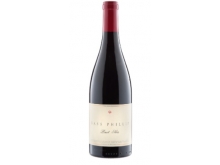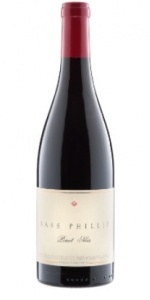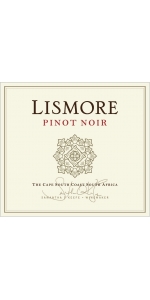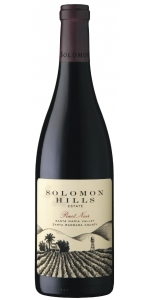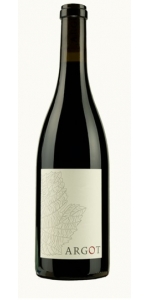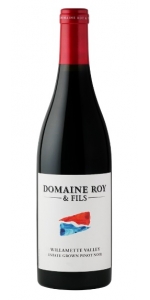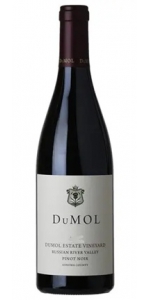Bass Phillips Estate Pinot Noir 2018
| Country: | Australia |
| Region: | South Eastern Australia |
| Winery: | Bass Phillip |
| Grape Type: | Pinot Noir |
| Organic: | Yes |
| Vintage: | 2018 |
| Bottle Size: | 750 ml |
Bass Phillips Estate Pinot Noir is made from 100 percent Pinot Noir.
For this reviewer's money, BP's Estate Pinot offers the best bang for buck. While still a special occasion wine, it's almost as gorgeous as its elder siblings, and crafted for drinking younger. Ironically, it's also the one that takes longest to open up. But when it does, it billows aromas of dried cranberry, cherry preserves, umami-like mushrooms, cocktail bitters and potpourri. The palate is silky with a lift of crystalline acidity, wound ultra fine, talc-like tannins. An iron fist in a velvet glove, this is long and elegant, able to age another 5-7 years but drinking beautifully right now.
-Wine Enthusiast 95 Points
Lismore Pinot Noir is made from 100 percent Pinot Noir
Complex bouquet of crushed rose petals, wild jasmine and fresh French herbs followed by a palate full of cranberry, raspberry and a long savory finish.
The grapes were picked at optimal ripeness. 30% whole bunch fermented in large 5000 liter vats with gentle pump-overs twice a day. The process allowed for a long extraction period which lends to the fruit expression and structure of this wine. The free run wine was drained off and the fermented grapes were then pressed in a traditional wooden basket press. The wine was racked into 225, 300 and 500 liter barrels where malolactic fermentation took place and the wine was aged for 10 months. 35% new French oak was used.
Review:
"The 2018 Pinot Noir comes from Walker Bay and Kaaimansgat and includes 30% whole-bunch fruit, aged for 11 months in 25% new oak. The bouquet sports vivid red cherry and raspberry fruit that is exceptionally well defined and beautifully integrated with the oak. The palate is medium-bodied with supple tannins, well-judged acidity and a slightly fleshy texture. There is just the right amount of salinity here, and the finish is kept on a tight leash, allowing the detail and precision to be fully expressed. A slight sour edge on the finish keeps you coming back for another sip. Excellent and reassuringly classy. - Neal Martin" - Antonio Galloni's Vinous (November 2019), 92 pts
"Walker Bay and Elandskloof are the twin sources of 30% whole bunch-fermented Pinot from Sam O'Keefe. Juicy, floral and charming, it's a graceful, fruit forward style with some clove and tobacco spice and refreshing acidity. The finish is a little firmer than I remember. 2020-24"- Tim Atkin (South Africa 2020 Special Report), 92 pts
Solomon Hills Estate Pinot Noir is made from 100 percent Pinot Noir.
Solomon Hills Pinot Noir is always distinctive and singular in its ability to harness the Coastal influence of Santa Maria Valley. Earth tones alongside briar bush and blueberries contrast aromas of forest floor and fired red clay. The noticeable savory elements of cracked black pepper and teriyaki beef nicely balance ripe cherries and blackberries on the palate.
Review:
I loved the bouquet of the 2021 Pinot Noir Solomon Hills, a light ruby-hued effort with perfumed darker cherry, mulberry, leafy herb, and smoked earth nuances. It's medium-bodied, has a layered, seamless texture, integrated tannins, and a gorgeous finish. It's absolutely brilliant. Enjoy bottles over the coming decade or more.
-Jeb Dunnuck 96 Points
Argot Pinot Noir Sonoma County is made from 100 percent Pinot Noir.
Everything you have come to expect from an Argot Pinot Noir, shone through the filter of a textbook-perfect vintage. We simply can not get over the quality of fruit this wine displays! Intense, yet fresh; fruity, yet spicy; brambly, yet juicy; immediate, yet lingering. A Pinot Noir that displays the variety’s natural come-hither attitude, while succinctly capturing its intriguing nature. There are not enough superlatives to describe this wine. Almost too easy to love!
VINEYARD Multiple vineyards throughout Sonoma County, including both valley floor and high-elevation hillside sites
PRODUCTION 600 cases
VARIETAL 100% Pinot Noir
CRUSH Night harvested by hand beginning in mid-September, concluding at our coolest sit on October 13. Cluster and berry sorted by hand, de-stemmed, no crushing
FERMENT 7-day cold soaks, followed by native fermentation in open-top containers, with the grapes fermenting on their skins for an average time of 14 days.
AGING 16 months, French oak barrels, 7% new, remainder once-used. Never racked prior to bottling. Bottled un-fined, unfiltered.
NOTES Singularly great. 2018 was an all-time vintage for California’s North Coast, achieving rarely before experienced heights. A mild summer gave way to Autumnal perfection, allowing cooler areas the opportunity to ripen their crop while chemistries remained perfect. What arrives in bottle is nothing short of a pinnacle representation of Sonoma County Pinot Noir — profound depth of pure, red Pinot Noir fruits, caressing textures balanced by deep minerality and a quenching acidity.
Maison Roy Willamette Valley Pinot Noir is made from 100 percent Pinot Noir.
The Willamette Valley Pinot Noir combines fruit from Roy's Dundee and Yamhill-Carlton estates. Gentle and suave, this Pinot offers inviting red fruit, baking spice, and a touch of purple floral tone. On the palate, a soft tannic structure makes this wine friendly and accessible in its youth and will keep drinking very well for the next 5-7years.
Our DuMOL Estate Vineyard is our original high-density vine planting from 2004. It’s organically farmed without irrigation – these vines work hard each season. We make a strict selection for this bottling, one of our flagship wines, so that only three acres of its nine total comprise this bottling; the balance forms the core of Highland Divide. This is the best of the best. The high vine density and exclusively Calera Selection produce a wine with a significant level of both tannin and acidity. This structure is buffered by a deep core of fruit extract, the product of the ripe grape skins themselves, and the essence of the wine. Each vintage can age for many years, and it gradually deepens into a woodsy, truffley, and enveloping wine with grand scale complexity while never relinquishing its inherent brightness.
The wine’s aromas and flavors are akin to black cherry, boysenberry, hibiscus, anise, moss, and juniper. The palate is simultaneously bright yet dark, with mineral drive, violet floral lift, and bay laurel freshness. Tannins and acidity fuse to lengthen these flavors, and the wine finishes with dried herbs and orange zest lift. Great aging potential. Drink between 2025 and 2034 and decant for an hour in its youth to hasten the development.
Review:
Medium to deep ruby-purple in color, the 2022 Pinot Noir Estate Vineyard comes barreling out with bold notes of fresh blackberries and black cherries opening out to suggestions of anise, garrigue, and lilacs. The medium-bodied palate reveals impactful black berry flavors with wonderfully spicy accents supported by grainy tannins and great tension, finishing long with a minerally lift. This is an all Calera vineyard. (LPB)
-The Wine Independent 97 Points
Bass Phillips Estate Pinot Noir is made from 100 percent Pinot Noir.
From the original Estate vineyard; 8,500 vines/hectare; specific plot cropping at approx. one tonne/acre, often blended with the best fruit from our Leongatha Vineyard. Wine with attractive, rich fruits in the mid-palate, with the strength to improve up to ten years in the cellar. Bottled without fining or filtration.
The exquisitely balanced single vineyard Estate Pinot Noir draws fruit from the extremely low cropping, closely spaced north easterly facing, four hectare un-irrigated vineyard. The wine is vinified in an open stainless steel fermenter with regular plunging to extract colour and flavour. After fermentation the wine is gravity racked into a combination of new (60%) and old French Alliers oak for a maturation period of around 15 to 18 months.
Review:
This bottling is the most linear and acid driven of the range. A translucent strawberry hue, the nose is open and elegant, with delicate aromas of fresh red berries, dried roses, white pepper, terra cotta and savory spice. There's an initial burst of tingly acidity on the tongue that mellows, allowing the silky textured fruit, savory, floral and mineral nuances to shine. Drink now–2030.
-Wine Enthusiast 96 Points
Bass Phillip is named after George Bass and Arthur Phillip – men of great pioneering spirit, foresight and leadership during the nineteenth century. The Bass Phillip vineyards were first established, many years later, in the southeastern corner of Australia in 1979, specialising in high-quality pinot noir and chardonnay wines.
Winemaking at Bass Phillip is uncompromising and driven by the respect for nature. The vineyards have been organic since 1993 and biodynamic since 2002. All wine production processes at Bass Phillip are guided by the cosmic rhythms that impart energy and vibrancy into the wines.
Made in a simple and traditional manner, with low-cropped vineyards, no irrigation and minimal intervention in the winery, the wines of Bass Phillip display flavours which are characteristic of the region and their individual vineyards. Deep mineral-rich soils, natural high humidity, and cooler temperatures in South Gippsland is also part of the magic that delivers the length, complexity, flavors, balanced acidity, and natural minerality to Bass Phillip wines. Combining undivided attention to detail in the vineyards and winery, and an insatiable passion for quality wine experiences, Bass Phillip produces extraordinary wines one vintage after another.
The most recent vintages of Bass Phillip pinot noir are the best we have produced. We put this down to older vines, more experience in winemaking, and continued sustainable practices in both the vineyards and winery.
What makes Bass Phillip unique?
Wines at Bass Phillip are handcrafted with strict scientific analysis and monitored with rigorous quality control. However the story doesn’t end there, the real essence of Bass Phillip’s wine production is to allow the forces of nature to maintain control. Minimal human intervention is practiced wherever possible – no irrigation/pesticides/fertilizers, minimal pumping/ filtration, natural yeast, no fining agents.
As a perfectionist, we crop our fruit at incredibly low levels to achieve the objectives in flavour development. We believe strongly in a gentle hand. Racking is kept to a minimum and no pumps are used in the winery. “The difference between good and great Pinot Noir is texture. We try to minimise the bruising effects that pumping can have on this texture.” Ultimately our priority is to produce a wine that is completely natural and which expresses vineyard site. This sounds simple, but such a high standard does require a relentless pursuit of perfection – and a degree of madness.
The Biodynamic practice at Bass Phillip is planned according to the lunar cycles. Adopting these practices means that each vintage of Bass Phillip wines exhibits the characteristics of “mother nature’s” temperament, expressing the harmony of earth, moon and sun. Displaying the natural influences of nature’s power and elegance.
South Gippsland's "Terroir"
South Gippsland is not only renowned for dairy and beef, but also the giant Gippsland earthworm, which play an active role in the fertilization and airing of the deep mineral-rich soil of the vineyards. The region is blessed with approx.1,000 millimetres of rainfall per annum and a deep, silty loam soil filled with volcanic minerals. High temperatures (mid 30 Celsius degrees) in the summer months are balanced by humidity and late afternoon, cool air from Bass Straight. All these factors contribute to the intense flavours, aromatics and exceptional length in the finish, which are trademarks of Bass Phillip’s vibrant, yet graceful wines.
Dense Vines & Low Yields
This is basically a story of “quality overrides quantity”
High density planting is one of the approaches taken by Bass Phillip to prove that Australia can produce a jaw-dropping pinot that is comparable with the best from the Pinot Monarch – Burgundy, France.
Bass Phillip achieves a cropping level of 1.0 -1.3 tonnes per acre (compared to from 2 to 4 tons per acre average in Australia). We believe this contributes to intensity and length of flavour which is not always prominent in Aussie pinots. Many question the economics of this low level of yield, but when the wine-making is driven by an obsession for perfection and instinctive flair, production costs become secondary.
Although a single vine at Bass Phillip barely makes half a bottle of wine, the highly perfumed nose, robust flavors, exquisite textures, profound complexity and minerality contained in each bottle provide a justification for this practice.
- back
SOLD BY THE BOX, NOT BY THE BOTTLE
IF YOU WOULD LIKE THE WOODEN BOX WE CHARGE A FLAT SHIPPING FEE OF 15 TO SHIP IT. JUST LET US KNOW ON THE COMMENT SECTION OF THE CHECKOUT PAGE.
The “Vintners Collection” gift boxes includes all six of Long Shadows’ acclaimed red wines packaged together in a beautifully branded wood box. Each of these wines were inspired and crafted by a world-renowned vintner to showcase the viticultural quality and caliber of Washington state’s Columbia Valley:
Pirouette: Philippe Melka (Vineyard 29, Lail, Hundred Acre) & Agustin Huneeus, Sr.(Quintessa)
Feather Cabernet Sauvignon: Randy Dunn (Dunn Vineyards)
Pedestal Merlot: Michel Rolland (International Wine Consultant)
Chester-Kidder: Allen Shoup (Chateau Ste. Michelle, CEO) & Gilles Nicault (Woodward Canyon)
Sequel Syrah: John Duval (Penfolds Grange, Plexus, Entity)
Saggi: Ambrogio & Giovanni Folonari (A & G Folonari Tenute, Tuscany)
Cap Cette Picpoul de Pinet is made from 100 percent Picpoul de Pinet
A very popular, traditional local variety planted on sun-drenched hillsides called "costières" (coastal region) in the Mediterranean garrigue, near the Etang de Thau - a coastal lagoon situated between the port of Sète and Marseillan.
The color is a superb pale yellow with bright hues. The nose is elegant, with aromas of fresh fruit and citrus fruit especially grapefruit. Well-balanced with typical focusing and zesty acidity. A pure expression of the grape varietal, the wine shows how good Picpoul can be when grown on its favorite terroir.
It will complement a vast array of dishes such as Asian cuisine, sushi, spicy fare and all sorts of seafood and grilled fish. Enjoy!

